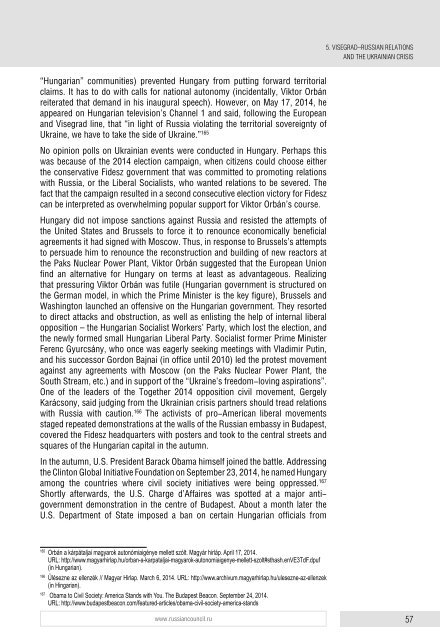RIAC-Visegrad-Report22-Eng
RIAC-Visegrad-Report22-Eng
RIAC-Visegrad-Report22-Eng
Create successful ePaper yourself
Turn your PDF publications into a flip-book with our unique Google optimized e-Paper software.
5. VISEGRAD–RUSSIAN RELATIONSAND THE UKRAINIAN CRISIS“Hungarian” communities) prevented Hungary from putting forward territorialclaims. It has to do with calls for national autonomy (incidentally, Viktor Orbánreiterated that demand in his inaugural speech). However, on May 17, 2014, heappeared on Hungarian television’s Channel 1 and said, following the Europeanand <strong>Visegrad</strong> line, that “in light of Russia violating the territorial sovereignty ofUkraine, we have to take the side of Ukraine.” 165No opinion polls on Ukrainian events were conducted in Hungary. Perhaps thiswas because of the 2014 election campaign, when citizens could choose eitherthe conservative Fidesz government that was committed to promoting relationswith Russia, or the Liberal Socialists, who wanted relations to be severed. Thefact that the campaign resulted in a second consecutive election victory for Fideszcan be interpreted as overwhelming popular support for Viktor Orbán’s course.Hungary did not impose sanctions against Russia and resisted the attempts ofthe United States and Brussels to force it to renounce economically beneficialagreements it had signed with Moscow. Thus, in response to Brussels’s attemptsto persuade him to renounce the reconstruction and building of new reactors atthe Paks Nuclear Power Plant, Viktor Orbán suggested that the European Unionfind an alternative for Hungary on terms at least as advantageous. Realizingthat pressuring Viktor Orbán was futile (Hungarian government is structured onthe German model, in which the Prime Minister is the key figure), Brussels andWashington launched an offensive on the Hungarian government. They resortedto direct attacks and obstruction, as well as enlisting the help of internal liberalopposition – the Hungarian Socialist Workers’ Party, which lost the election, andthe newly formed small Hungarian Liberal Party. Socialist former Prime MinisterFerenc Gyurcsány, who once was eagerly seeking meetings with Vladimir Putin,and his successor Gordon Bajnai (in office until 2010) led the protest movementagainst any agreements with Moscow (on the Paks Nuclear Power Plant, theSouth Stream, etc.) and in support of the “Ukraine’s freedom-loving aspirations”.One of the leaders of the Together 2014 opposition civil movement, GergelyKarácsony, said judging from the Ukrainian crisis partners should tread relationswith Russia with caution. 166 The activists of pro-American liberal movementsstaged repeated demonstrations at the walls of the Russian embassy in Budapest,covered the Fidesz headquarters with posters and took to the central streets andsquares of the Hungarian capital in the autumn.In the autumn, U.S. President Barack Obama himself joined the battle. Addressingthe Clinton Global Initiative Foundation on September 23, 2014, he named Hungaryamong the countries where civil society initiatives were being oppressed. 167Shortly afterwards, the U.S. Charge d’Affaires was spotted at a major antigovernmentdemonstration in the centre of Budapest. About a month later theU.S. Department of State imposed a ban on certain Hungarian officials from165Orbán a kárpátaljai magyarok autonómiaigénye mellett szólt. Magyár hirláp. April 17, 2014.URL: http://www.magyarhirlap.hu/orban-a-karpataljai-magyarok-autonomiaigenye-mellett-szolt#sthash.enVE3TdF.dpuf(in Hungarian).166Ülésezne az ellenzék // Magyar Hirlap. March 6, 2014. URL: http://www.archivum.magyarhirlap.hu/ulesezne-az-ellenzek(in Hingarian).167Obama to Civil Society: America Stands with You. The Budapest Beacon. September 24, 2014.URL: http://www.budapestbeacon.com/featured-articles/obama-civil-society-america-standswww.russiancouncil.ru57


